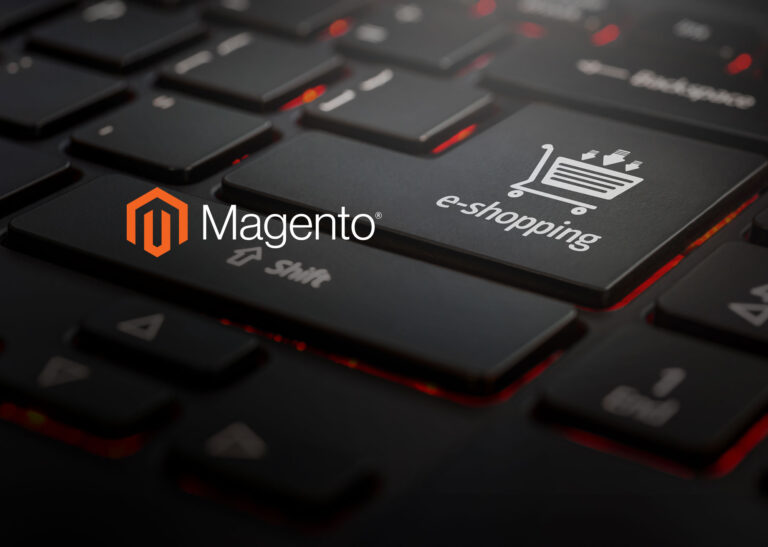If you’re running an e-commerce site, you’re probably grappling with the challenge of growth and staying competitive. Key questions you might find yourself pondering include whether your current e-commerce platform is feature-rich enough, integrates well with other systems, or can smoothly handle high transaction volumes. If you’re uncertain about any of these aspects, it might be time to consider a new solution. In the upcoming article, we’ll explore the benefits and opportunities provided by the open-source Magento 2 platform, a choice that could revolutionize your online business.
Custom or Open-Source
First, you need to decide whether to opt for a solution developed by a software house (vendor lock-in) or to use one of the ready-made e-shop platforms. Both options have their pros and cons. Perhaps the most significant difference is the degree of dependency on the solution provider. Here, e-commerce platforms, whether boxed (like Shoptet or Shopify) or open-source (like Magento 2 or Prestashop), clearly win.
If you are looking for flexibility, scalability, and do not want to spend most of your e-shop budget on licensing fees, we recommend taking a closer look at Magento 2. This open-source platform has become the number one choice in recent years for medium and larger e-shops, as well as brands anticipating expansion.

Some Interesting Figures
- Magento ranks among the top 10 e-commerce solutions worldwide.
- Businesses using Magento grow, on average, three times faster.
- Magento enjoys popularity among developers, with more than 5,000 downloads daily.
- Magento processes transactions worth $155 billion annually.
- More than 80% of the code base is written in PHP, supporting its latest versions.
Magento Community vs. Adobe Commerce
The development of the Magento e-commerce platform began in 2007, driven by a group of open-source enthusiasts. It was later acquired by Adobe and is now available to customers in two versions:
- Magento Community – This is a freely available open-source version that doesn’t require licensing fees. However, it might incur additional costs for hosting, development, and maintenance. You can download the base code for free and enhance its core functionalities with custom modules or ready-made extensions from the Magento Marketplace.
- Adobe Commerce (formerly Magento Enterprise) – This is a paid solution with annual licensing fees based on the company’s gross revenue. The feature set in this package is significantly more extensive, making Adobe Commerce the preferred choice for B2B companies and e-shops with a large product catalog, extensive global reach, and plans for further expansion. This version is also available in the cloud.
When to Start with Magento Community (Free Version)?
- Consider starting with Magento Community if you’re looking for a cost-effective solution to create and manage your e-shop without the need for substantial investments in licenses, especially if you’re already contemplating future expansion.
- Opt for Magento Community if you desire the freedom to develop and design your e-shop, and you’re willing to invest in creating custom functionalities or third-party integrations.
- It’s suitable if you’re entering a new market with a limited budget and aim for a quality, scalable e-shop without upfront or licensing fees.
- Magento Community is ideal if you want to experiment with the latest e-commerce technologies, test new features, integrations, and business strategies, and quickly adapt to changing market conditions and customer preferences.
- It’s the right choice if you can handle the platform’s development or maintenance with your own development team or with the support of an external developer or agency.
Why Opt for Magento 2?
With each new iteration, Magento has consistently delivered enhancements and expanded functionality. The transition to Magento 2.0 marked a significant leap forward, with notable gains in performance, security, and ease of use. Presently, we are deploying Magento 2.4 for our clientele, which not only embraces the latest in PHP but also introduces sophisticated features tailored for the B2B sector.
There are several reasons to choose Magento 2 for your e-shop. We’ve selected the most crucial ones based on our experience.
- Open Source
When asked why choose Magento, a common response is: because it’s open-source. The ability to customize your e-shop to your vision is significantly limited with boxed solutions. With Magento, you can modify code, tailor templates, and tweak functions to meet your exact needs. - Scalability
Magento’s scalability is one of the platform’s strongest points. It can handle more than 500,000 products on one server and process thousands of transactions per hour, allowing you to smoothly expand your business. Whether you start with the free version, you can easily transition to Commerce or even Commerce Cloud. - Unmatched Performance
Regardless of your store’s size, Magento leads in performance. It offers powerful web pages with minimal server resources, a key attribute of the platform. - Multistore
From one administrative interface, you can manage products, invoices, and customer information across multiple e-shops. The long-term benefits of multistore include saving time and money. - Mobile Device Support
Magento Community and Adobe Commerce versions support mobile devices, enabling you to create a store that provides an exceptional user experience on both mobiles and computers. You can design your unique responsive theme or choose from pre-made ones. Moreover, Magento PWA Studio allows the creation of reliable, fast, and engaging mobile applications to complement your e-shop. - Built-in SEO Features
Regarding search engine optimization, Magento offers several built-in features on top of best practices and high performance that will boost your search result rankings on Google or Bing:- Metadata for homepage and product pages
- Canonical tags and URLs to prevent duplicate content
- SEO-friendly redirects
- Robots.txt and XML sitemaps
- Community and Support
An active developer community is integral to open-source. Magento is attractive to developers, meaning you can turn to the Magento community for support and assistance in case of issues. Experienced programmers can find answers to almost all their questions in specialized forums.

Conclusion
To be fair, Magento does have certain disadvantages, which could be categorized as technical challenges. If you don’t code yourself, expect some overhead costs and a longer project timeline. However, these can be effectively addressed by partnering with a reliable provider.
With proper implementation and utilization of all available tools, Magento 2 can be a real game-changer for your e-shop, especially if your goal is growth and expansion into new markets. Get inspired by brands like GymBeam, Decathlon, Eobuv.sk, and others.
Curious or have queries?
Why not join us for an informal workshop where we aim to address your concerns!

Pavol Pavuk
The author of the article is a project manager passionate about agile methodologies. Pali oversees projects and pre-sales activities mainly in e-commerce and CX, ensuring two-way communication, mutual satisfaction, and the quality of deliverables.





